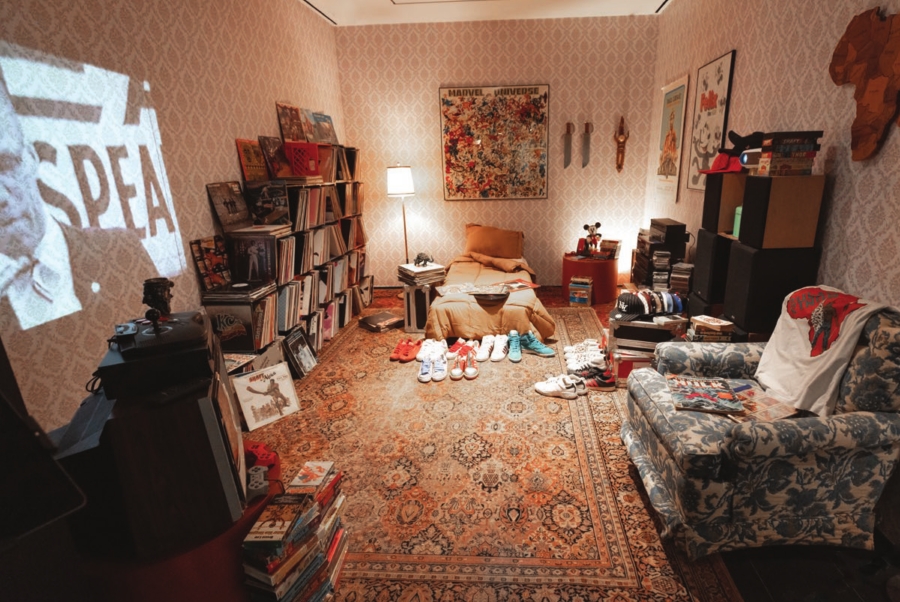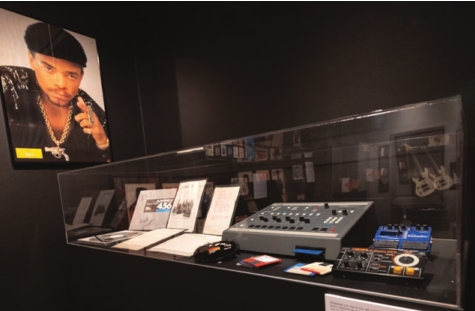
Installation views of “Day One DNA: 50 Years in Hiphop Culture.”

A deep dive into the archives of Ice T and Afrika Islam at Harvard
Concerts throughout the city have been honoring the 50th anniversary of hiphop, a genre born, according to the prevailing narrative, at a Bronx house party in 1973. Harvard University’s Ethelbert Cooper Gallery of African and African American Art marks this milestone with an exhibition of hip-hop ephemera and artifacts from the private archives of hip-hop pioneers Ice T & DJ Afrika Islam, longtime friends and collaborators.
Organized by curator Laylah Amatullah Barrayn and on view through May 31, “Day One DNA: 50 Years in Hiphop Culture” presents more than 200 objects, including photographs, custom-made garments, jewelry, musical instruments, recording equipment, memorabilia, film clips and posters.
Ice T, the longest-running male actor in a TV series (“Law & Order: Special Victims Unit”), was a founder of gangster rap. Bronx-born DJ Afrika Islam is a multi-platinum music producer and record-label owner and honorary DMC World DJ Hall of Fame Champion.
Both Ice T and Afrika Islam are two-time Grammy winners, and they began their joint musical ventures and friendship in the early ’80s, after meeting at the seminal Los Angeles hip-hop venue Radiotron, the setting for the movies “Breakin’” and “Breakin’ 2: Electric Boogaloo.”
The centerpiece of the Cooper Gallery exhibition is a full-size replica of DJ Afrika Islam’s bedroom in his cramped South Bronx apartment, where he hosted Ice T while introducing him to the hip-hop scene in New York. As a result of this visit, Ice T landed a groundbreaking deal with Sire Records, becoming the first West Coast rapper to sign with a major label. His debut album, “Rhyme Pays,” was first produced in Afrika Islam’s apartment.
The installation includes hundreds of records from the apartment’s collection, which Afrika Islam drew from to concoct his virtuoso DJ performances. Nearby is the combination drum machine/sampler that Afrika Islam used to compose music on four Ice T albums.
A listening station plays excerpts from “Zulu Beat,” the world’s first hip-hop radio show, launched by Afrika Islam in 1982 on New York’s WHBI 105.9 FM. Its broadcasts sample every genre of music in the African Diaspora, including funk, jazz, gospel and R&B.
Archival footage offers glimpses of break-dancing forerunners in action, including martial-arts masters, and a clip of James Brown somersaulting across the stage in an orange body suit. Nearby, a cut from “Breakin’ ’N’ Enterin’” (1983) shows Ice T rapping and leaping in an orange beret and body suit.
A gallery presents selections from Marvel Comics cartoon books that influenced the style of subway-tagging graffiti artists, as well as a display about the Universal Zulu Nation, including its signature costumes and jewelry and a 1973 manifesto. This document states that the mission of the grass-roots organization is to promote the emerging hip-hop culture — encompassing rap music, breakdancing, DJing and aerosol art — as a movement fostering Black pride and resilience and a community in which all can gain a voice.
Learn more: coopergallery.fas.harvard.edu/day-one-dna